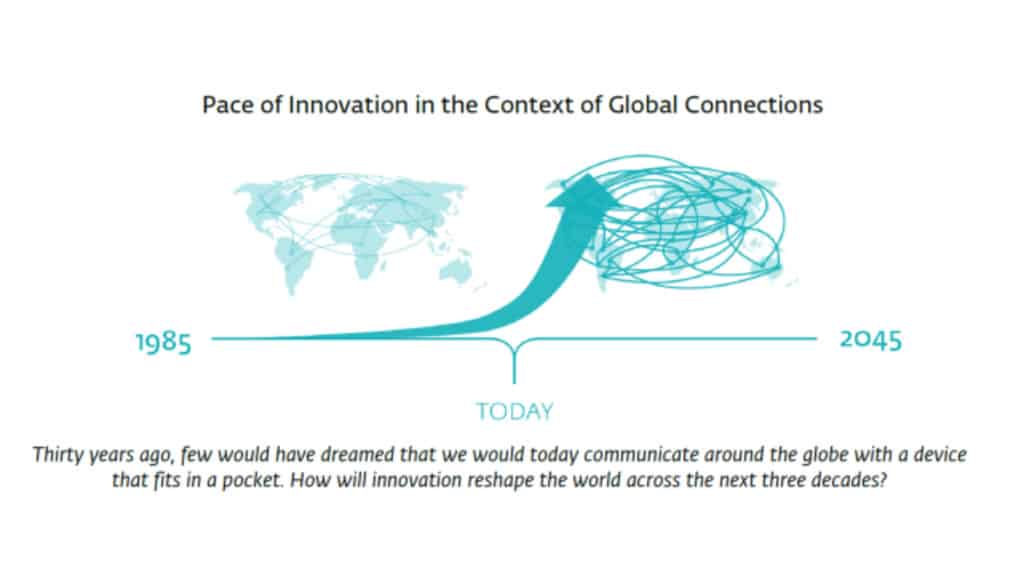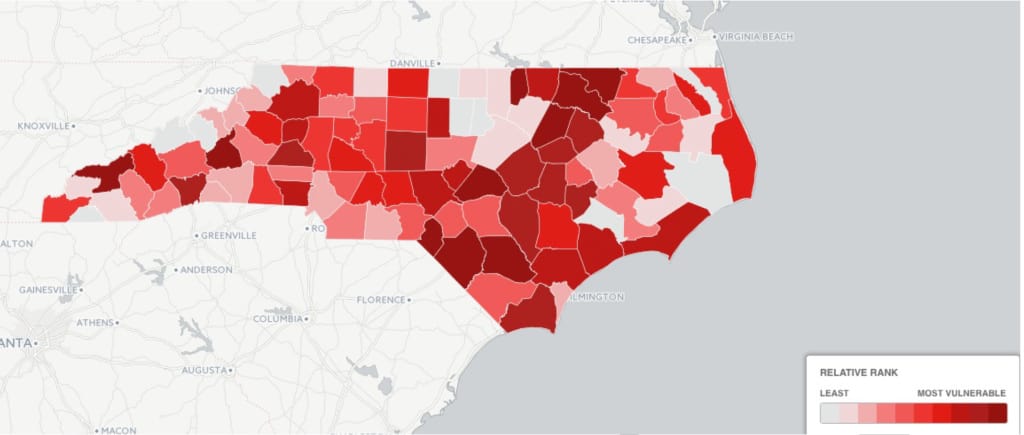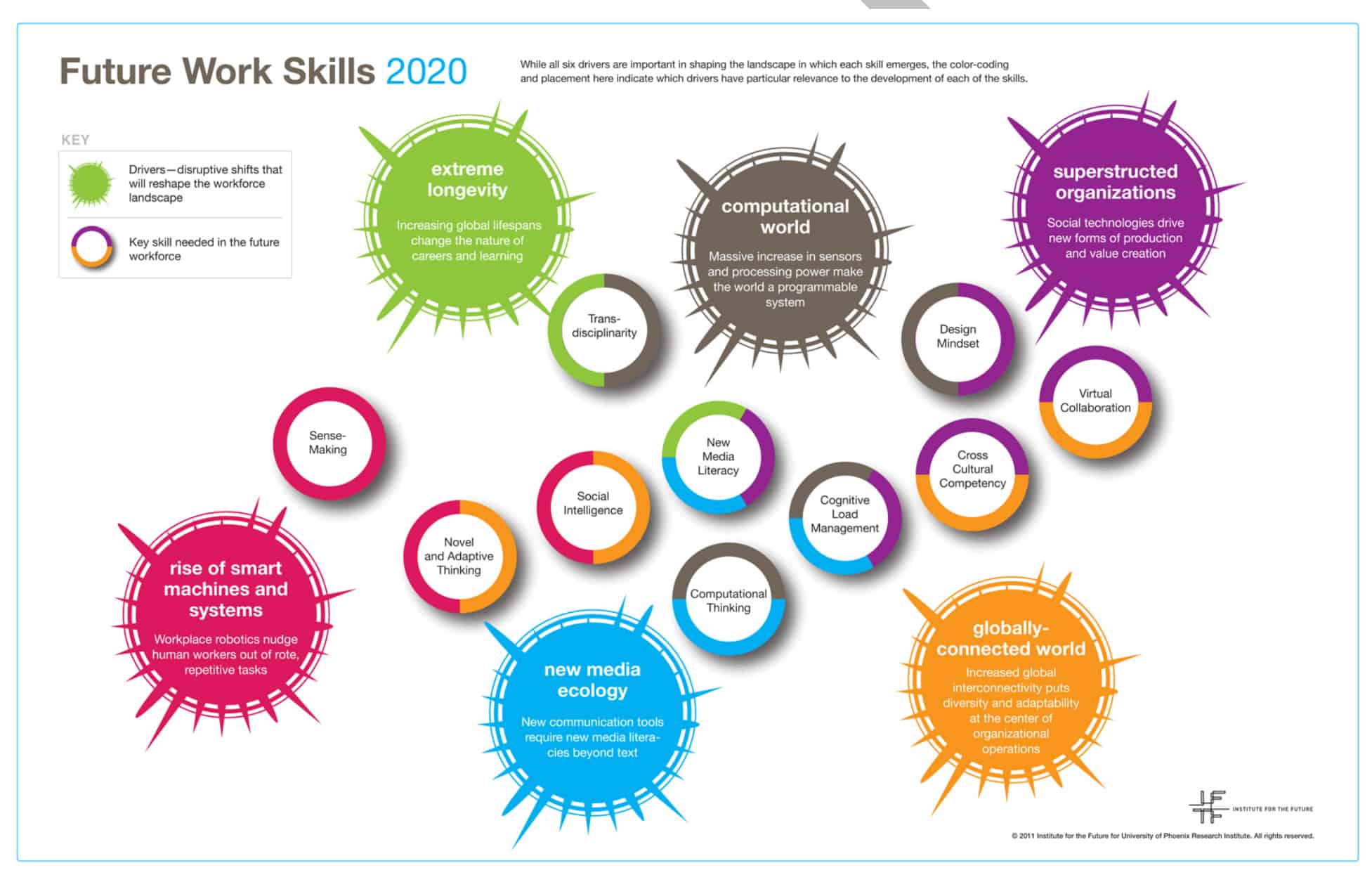We need new strategies for reskilling in a world where innovation looks like this.


As market demand for labor rapidly evolves, so too do the demographics of North Carolina’s labor force. These trends are converging in ways that demand North Carolina rethink its approach to preparing its people for the future of work. Our institutions of learning will be critical to our preparation.
The Institute for Emerging Issues recently released a report, The North Carolina Disruption Index, which emphasizes significant changes in the job market that counties across the state will face in coming years. All counties are implicated.


Relatedly, the Institute for the Future has analyzed the changing landscape of work and identified key work skills they think will be needed in the next ten years.
Our challenge as a state is to identify opportunities that North Carolina must leverage today to successfully navigate the transformational employment market changes ahead. The Institute for Emerging Issues put that challenge before two groups, a Working Group of workforce and economic development organizations, industry, education systems, policy makers, current and future employees, and other key stakeholders, and Forum Ambassadors, career counseling professionals working in high schools, community colleges, universities, NCWorks Career Centers, local government workforce agencies, and community-based organizations.
Their efforts produced five responsive strategies organized thematically in two groups below. We are offering them for consideration by participants at the 2016 Emerging Issues Forum, FutureWork on February 8, 2016.
You don’t have to be in the room to share your thoughts. You may participate and vote live through the live stream at www.emergingissues.org or on UNC-TV’s new North Carolina Channel. Information will be up on our website on Monday morning as you tune in to the live stream and as well as on the UNC-TV website. Vote by 5:00 pm on February 8 to have your vote counted.
ENHANCE ENGAGEMENT AMONG COMMUNITY STAKEHOLDERS, ESPECIALLY BUSINESS
Context: Currently, job seekers often have difficulty accessing sufficient information concerning employment and career opportunities. Various barriers, including imperfect information networks, fragmented talent-development pipelines and long transportation commute times, can limit access to opportunity. These barriers stymie growth opportunities for job seekers and employers alike. A better understanding of community assets can identify such obstacles and help determine where to target investments. Of particular importance, as businesses are confronted with accelerating rates of change that must be met with responsive strategies and constant organizational restructuring and retraining, the risk of disconnections between industry and community partners increases. Business must be capable of identifying and establishing pathways to career opportunities, and education partners must recognize that increasing automation will drive a need for more differentiated education programs.
Strategy 1: More Differentiated Programs: Employers must identify the technical and differentiated skills they require and make those known to the higher education system, which must in turn be expeditious and flexible in their responses (i.e., tailoring differentiated programs to smaller groups, as compared to general programs for larger groups). Industry needs must be reflected in the way higher education structures and pays for its education programs.
Strategy 2: Enhanced Career Pathways Initiative: Within five years, the North Carolina Department of Commerce, education system (from K-12 through higher education), workforce and economic development groups, Chambers of Commerce, and non-profits should work together to create an enhanced Career Pathways initiative. The initiative should encompass the life course of the individual, beginning with pre-K programming. Individual life course plans should identify student interests and take inventory of possible career exploration activities. These activities can be developed regionally via collaboration by industry and community colleges, or through non-profits serving as brokers between students and industry.
Strategy 3: Project-Based Learning: Employers should provide students with project-based learning opportunities that extend beyond the learning outcomes mandated by the North Carolina Department of Public Instruction.
PROMOTE INNOVATIVE LEARNING AND TALENT DEVELOPMENT MODELS
Context: Continued changes in the job market will mean that people will switch jobs, and even industries, multiple times throughout their careers. This new job market will demand new and faster options for training that go well beyond today’s existing degree and credential models. Our current learning models are designed for 19th-century workplaces and assign disproportionate responsibility and risk to the education system without sufficient integration with and buy-in from industry. Many argue, as well, that we are experiencing a crisis of innovation and are unable to produce enough entrepreneurs to move inventions to market and thereby create jobs.
Strategy 4: Increase Education System Equity: Within five years, state leaders, including the legislature, cabinet, and Governor’s office, should develop a comprehensive plan to increase education system equity. This plan must support the development of a fully representative (race, gender, age) workforce that possesses the skills and talents desired by tomorrow’s industries. The plan should address accessibility of education from pre-K to higher education; diversity in participation across the system; resource allocation; and the achievement gap.
Strategy 5: Self-Ownership of Career Development: Within 10-15 years, create and promote a new mindset and culture in North Carolina’s future workforce aimed at empowering and encouraging young people to be innovators, creators, and active agents of change in their lives and beyond. This effort, to be driven collaboratively by parents, the K-12 education system, and 2- and 4-year colleges and universities, will result in enhanced self- advocacy and self-determination, with future workforce members assuming greater ownership of their life and career trajectories.
Thank you for sharing your thoughts to support our next generation of workers.




